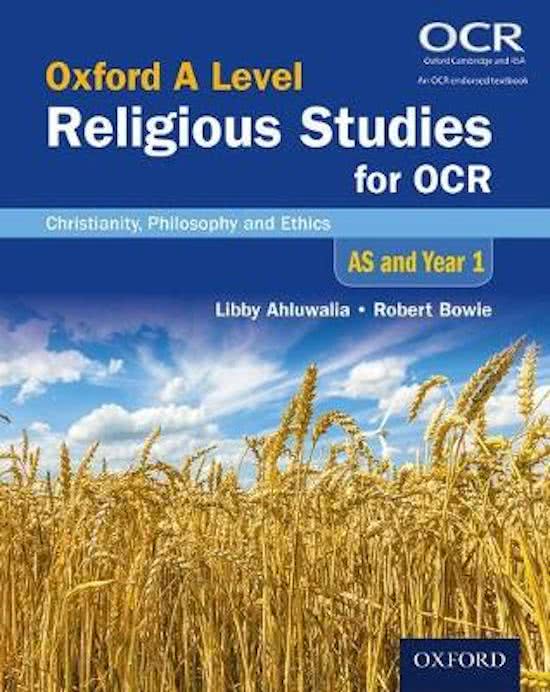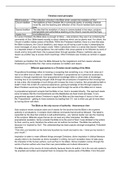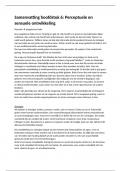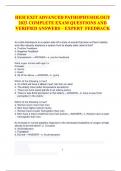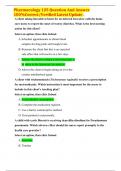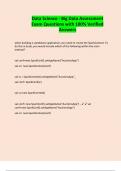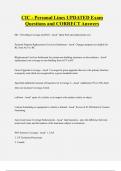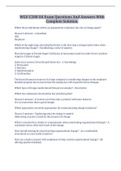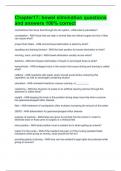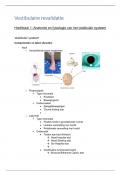Christian moral principles
Bible/scripture The collection of books in the Bible which contain the revelation of God
Church tradition The traditions of how Christian life in community works, in worship, practical
moral life, and the teaching and reflection of the Church handed down across
time
Sacred tradition The idea that the revelation of Jesus is communicated in two ways; scripture
and apostolic and authoritative teaching of the Church councils and the Pope
Agape love Unconditional love
For some Christians the Bible alone is enough to follow – sola scriptura; they see it as containing the
commands of God. Bible-based morality is about obedience which can be plainly read. For others, the
Chruch’s tradition makes sense of the Bible. Within the Protestant tradition, there is a view that sees
the Bible (scripture), the Church (tradition), and reason as all having a part to play in interpreting the
moral messages of Jesus for today’s world. Within Catholicism there is a sense that Sacred Tradition
is a separate stream of moral guidance, the oral tradition that Jesus passed to his followers by word of
mouth and by living with them; this is passed down through apostles (Popes). Catholics also see
reason as another way to access God’s teachings. Other Christians see morality as centred on agape
love.
Catholics put tradition first, then the Bible followed by the magisterium and then reason whereas
Protestants put the Bible first, then some emphasis on tradition and reason.
Different approaches to a Christian moral reading of the Bible
Propositional knowledge refers to knowing or accepting that something is so; it has truth value as it
has to be either true or false or in between. Revelation is propositional as it cannot be accessed by
reason or through experienced. Non-propositional knowledge refers to other kinds of knowledge;
knowing how to do something and gain skills through the procedures of experience like knowing how
to ride a bike. My knowledge of such things will increase the more I practice. Non-propositional faith is
belief in God; this is faith of a personal experience, gaining knowledge of God through experience.
Most Christians would say that they learn about God through the words of the Bible and in nature.
A propositional approach accepts that the Bible is true; God is revealed directly. This approach leads
some to believe that the Commandments and the Beatitudes are fixed moral principles. A non-
propositional approach allows Christians to apply the Bible and the teachings of Jesus to their own
life. Propositional – getting to know someone by reading their CV, non is when you get to know them
by having dinner with them.
The Bible as the only source of authority - theonomous view
Sola scripture means scripture alone and it stands for the doctrine that the Bible is the supreme
authority in all situations. It contains God’s biblical commands that should be followed. This belief is
supported by the idea that scripture is self-authenticating – any rational reader can see the meaning
of the scripture. Biblicists argue that we do not need any other interpreter; the Bible offers
propositional revelation. Some consider the Bible to be the word of God; it was dictated to the writers
by God, word by word, therefore the writers are not authors but scribes. The Bible has authority
because it is ‘inspired by God’. This understanding has been popular amongst evangelical, Protestant
churches.
“Then the Lord reached out his hand and touched my mouth and said to me, ‘I have put my words in
your mouth’.”
Inspiration is taken to mean different things amongst Christians; divine inspiration in biblical literature
usually refers to its character as divine revelation in writing, but such revelation does not take away
the character of the human authors, such as Paul in his letters. Divine revelation comes through the
words of human authors who have their own personalities and cultural dimensions.
The Bible alone is the source of moral authority because God is its author. He is the one who spoke to
his prophets and writers and inspired them to compose the various parts of the Bible. From this point
, of view, the Bible is infallible and if there are problems with understanding a biblical text, the problem
lies with us, not the text.
The main advantage of using the Bible is that it is not just commandments, but there are applicable
stories too. For example, the story of King David’s adulterous relationship with Bathsheba in which he
not only makes her pregnant but also misuses his kingly powers and causes the death of her husband
illustrates how not to live a moral life. The story also demonstrates that David is not merely judged on
whether he has broken the commandments but the kind of person he is. By contrast, Uriah is
everything which David is not such as honest and courageous.
In the Old Testament, the covenant establishes the notion that ethics are both social and personal.
The Ten Commandments is a summary of these two ideas. In the New Testament, Jesus’ Sermon on
the Mount is often considered the focal point of his moral teaching. Jesus teaches that the new
covenant is not only about keeping the law as set out in the Old Testament but the inner law of love,
righteousness, peace and faith.
No intelligent reading of the Bible can take every word literally and at face value. For example, Jesus
says, ‘If your right eye causes you to sin, tear it out and throw it away’. Even conservative Christians
understand that this is a metaphor for repentance. This example illustrates the dangers of a limited
understanding of how to interpret the Bible. Karl Barth also warned of the dangers of literalism
because it falsely gives the Bible a divine status which may only be attributed to God; he called this
bibliolatry, which is the false worship of the Bible. The Bible’s words, therefore, are a witness to the
Word, not the Word itself.
The Old Testament permits war and retributive justice, summarised as an ‘eye for an eye, a tooth for
a tooth’. Capital punishment is seen to be part of God’s judgement. The death penalty is for all those
who undermine social order such as murder, adultery and dishonouring parents. In Deuteronomy,
which sets out the rules of war, the Israelites are permitted to kill foreign women and children.
However, Jesus’ Sermon on the Mount replaces retribution with reconciliation and love for one’s
enemies. In an imperfect world, the use of war and violence is a necessary evil which is the view of
many such as Augustine, Luther and conservative interpreters today. Yet, even those who are not
Biblicists such as MLK argue that the biblical vision of pacifism and non-violence is the one which
Christians have a duty to follow because it is at the heart of Jesus’ teaching on love.
This approach makes the Bible infallible, and therefore believers know they can rely on what it says.
This view is therefore useful when relying on the Bible for advice or guidance. Richard Mouw rejects
the belief that all you need is love as just because there is one commandment focused on love does
not mean we can rule out all other commandments. He recognises that not all commandments are
applicable today.
Christians who use this approach will therefore strictly follow the commandments and using teachings
and principles to modern situations like genetic modification.
Criticisms
Critics argue that it is impossible to read the Bible straight without making any interpretation of it, we
are bound to read it subjectively in relation to our own experiences as we are all individuals with our
own lives and thoughts which cannot be separated from our interpretations. This is a problem for
Richard Hays who claims that the Bible should be the main source (prima scripture) but cannot be
interpreted without reference to tradition.
The Bible also contains many different writing styles which does not fit in with the belief that God
dictated every word. For instance, Matthew’s Gospel contains allusions to Jewish culture and
scriptures which gives the impression that him and his intended audience was Jewish whereas Luke
pauses to explain Jewish aspects which gives the impression that his readers were not Jewish.
Moreover, the Sermon on the Mount contradicts teachings of the Old Testament; if God wrote every
word then surely it would be consistent. There are rules that Christians disregard such as the rules in
Leviticus which are not to do with morality such as the ban on touching pig skin or cutting facial hair.
Bible/scripture The collection of books in the Bible which contain the revelation of God
Church tradition The traditions of how Christian life in community works, in worship, practical
moral life, and the teaching and reflection of the Church handed down across
time
Sacred tradition The idea that the revelation of Jesus is communicated in two ways; scripture
and apostolic and authoritative teaching of the Church councils and the Pope
Agape love Unconditional love
For some Christians the Bible alone is enough to follow – sola scriptura; they see it as containing the
commands of God. Bible-based morality is about obedience which can be plainly read. For others, the
Chruch’s tradition makes sense of the Bible. Within the Protestant tradition, there is a view that sees
the Bible (scripture), the Church (tradition), and reason as all having a part to play in interpreting the
moral messages of Jesus for today’s world. Within Catholicism there is a sense that Sacred Tradition
is a separate stream of moral guidance, the oral tradition that Jesus passed to his followers by word of
mouth and by living with them; this is passed down through apostles (Popes). Catholics also see
reason as another way to access God’s teachings. Other Christians see morality as centred on agape
love.
Catholics put tradition first, then the Bible followed by the magisterium and then reason whereas
Protestants put the Bible first, then some emphasis on tradition and reason.
Different approaches to a Christian moral reading of the Bible
Propositional knowledge refers to knowing or accepting that something is so; it has truth value as it
has to be either true or false or in between. Revelation is propositional as it cannot be accessed by
reason or through experienced. Non-propositional knowledge refers to other kinds of knowledge;
knowing how to do something and gain skills through the procedures of experience like knowing how
to ride a bike. My knowledge of such things will increase the more I practice. Non-propositional faith is
belief in God; this is faith of a personal experience, gaining knowledge of God through experience.
Most Christians would say that they learn about God through the words of the Bible and in nature.
A propositional approach accepts that the Bible is true; God is revealed directly. This approach leads
some to believe that the Commandments and the Beatitudes are fixed moral principles. A non-
propositional approach allows Christians to apply the Bible and the teachings of Jesus to their own
life. Propositional – getting to know someone by reading their CV, non is when you get to know them
by having dinner with them.
The Bible as the only source of authority - theonomous view
Sola scripture means scripture alone and it stands for the doctrine that the Bible is the supreme
authority in all situations. It contains God’s biblical commands that should be followed. This belief is
supported by the idea that scripture is self-authenticating – any rational reader can see the meaning
of the scripture. Biblicists argue that we do not need any other interpreter; the Bible offers
propositional revelation. Some consider the Bible to be the word of God; it was dictated to the writers
by God, word by word, therefore the writers are not authors but scribes. The Bible has authority
because it is ‘inspired by God’. This understanding has been popular amongst evangelical, Protestant
churches.
“Then the Lord reached out his hand and touched my mouth and said to me, ‘I have put my words in
your mouth’.”
Inspiration is taken to mean different things amongst Christians; divine inspiration in biblical literature
usually refers to its character as divine revelation in writing, but such revelation does not take away
the character of the human authors, such as Paul in his letters. Divine revelation comes through the
words of human authors who have their own personalities and cultural dimensions.
The Bible alone is the source of moral authority because God is its author. He is the one who spoke to
his prophets and writers and inspired them to compose the various parts of the Bible. From this point
, of view, the Bible is infallible and if there are problems with understanding a biblical text, the problem
lies with us, not the text.
The main advantage of using the Bible is that it is not just commandments, but there are applicable
stories too. For example, the story of King David’s adulterous relationship with Bathsheba in which he
not only makes her pregnant but also misuses his kingly powers and causes the death of her husband
illustrates how not to live a moral life. The story also demonstrates that David is not merely judged on
whether he has broken the commandments but the kind of person he is. By contrast, Uriah is
everything which David is not such as honest and courageous.
In the Old Testament, the covenant establishes the notion that ethics are both social and personal.
The Ten Commandments is a summary of these two ideas. In the New Testament, Jesus’ Sermon on
the Mount is often considered the focal point of his moral teaching. Jesus teaches that the new
covenant is not only about keeping the law as set out in the Old Testament but the inner law of love,
righteousness, peace and faith.
No intelligent reading of the Bible can take every word literally and at face value. For example, Jesus
says, ‘If your right eye causes you to sin, tear it out and throw it away’. Even conservative Christians
understand that this is a metaphor for repentance. This example illustrates the dangers of a limited
understanding of how to interpret the Bible. Karl Barth also warned of the dangers of literalism
because it falsely gives the Bible a divine status which may only be attributed to God; he called this
bibliolatry, which is the false worship of the Bible. The Bible’s words, therefore, are a witness to the
Word, not the Word itself.
The Old Testament permits war and retributive justice, summarised as an ‘eye for an eye, a tooth for
a tooth’. Capital punishment is seen to be part of God’s judgement. The death penalty is for all those
who undermine social order such as murder, adultery and dishonouring parents. In Deuteronomy,
which sets out the rules of war, the Israelites are permitted to kill foreign women and children.
However, Jesus’ Sermon on the Mount replaces retribution with reconciliation and love for one’s
enemies. In an imperfect world, the use of war and violence is a necessary evil which is the view of
many such as Augustine, Luther and conservative interpreters today. Yet, even those who are not
Biblicists such as MLK argue that the biblical vision of pacifism and non-violence is the one which
Christians have a duty to follow because it is at the heart of Jesus’ teaching on love.
This approach makes the Bible infallible, and therefore believers know they can rely on what it says.
This view is therefore useful when relying on the Bible for advice or guidance. Richard Mouw rejects
the belief that all you need is love as just because there is one commandment focused on love does
not mean we can rule out all other commandments. He recognises that not all commandments are
applicable today.
Christians who use this approach will therefore strictly follow the commandments and using teachings
and principles to modern situations like genetic modification.
Criticisms
Critics argue that it is impossible to read the Bible straight without making any interpretation of it, we
are bound to read it subjectively in relation to our own experiences as we are all individuals with our
own lives and thoughts which cannot be separated from our interpretations. This is a problem for
Richard Hays who claims that the Bible should be the main source (prima scripture) but cannot be
interpreted without reference to tradition.
The Bible also contains many different writing styles which does not fit in with the belief that God
dictated every word. For instance, Matthew’s Gospel contains allusions to Jewish culture and
scriptures which gives the impression that him and his intended audience was Jewish whereas Luke
pauses to explain Jewish aspects which gives the impression that his readers were not Jewish.
Moreover, the Sermon on the Mount contradicts teachings of the Old Testament; if God wrote every
word then surely it would be consistent. There are rules that Christians disregard such as the rules in
Leviticus which are not to do with morality such as the ban on touching pig skin or cutting facial hair.

